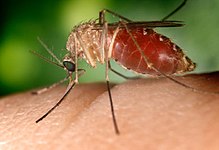Skeeter syndrome
| Skeeter syndrome | |
|---|---|
 | |
| Culex mosquito on a human finger |
Skeeter syndrome (papular urticaria) is a localized allergic reaction to mosquito bites,[1] consisting of inflammation and sometimes fever. It is caused by allergenic polypeptides in mosquito saliva, and therefore is not contagious.[2]
Taking oral cetirizine regularly has been known to help those who suffer from skeeter syndrome.
Although the term seems informal, it has appeared in the published literature.[3]
Diagnosis
Clinical examination alone cannot distinguish between a response caused by infection, such as cellulitis, and skeeter syndrome. However, skeeter syndrome usually progresses over the course of hours versus cellulitis, which typically evolves over the course of several days. As such, accurate history is imperative when making the diagnosis. Since IgE and IgG are key players in mosquito allergy, diagnosis can be confirmed by an immunosorbent assay measuring IgE and IgG to mosquito saliva antigens.[citation needed]
References
- ^ "'Skeeter Syndrome' Describes Local Allergic Reactions to Mosquito Bites". AllergyWatch. 2 (1). The American College of Allergy, Asthma & Immunology. 2000. Retrieved 2012-05-18.
- ^ Isawa, Haruhiko; Yuda, Masao; Orito, Yuki; Chinzei, Yasuo (2002). "A mosquito salivary protein inhibits activation of the plasma contact system by binding to factor XII and high molecular weight kininogen". Journal of Biological Chemistry. 277 (31): 27651–8. doi:10.1074/jbc.M203505200. PMID 12011093.
{{cite journal}}: CS1 maint: unflagged free DOI (link) - ^ Simons, F.Estelle R.; Peng, Zhikang (1999). "Skeeter syndrome". Journal of Allergy and Clinical Immunology. 104 (3): 705. doi:10.1016/S0091-6749(99)70348-9. PMID 10482852.
External links
